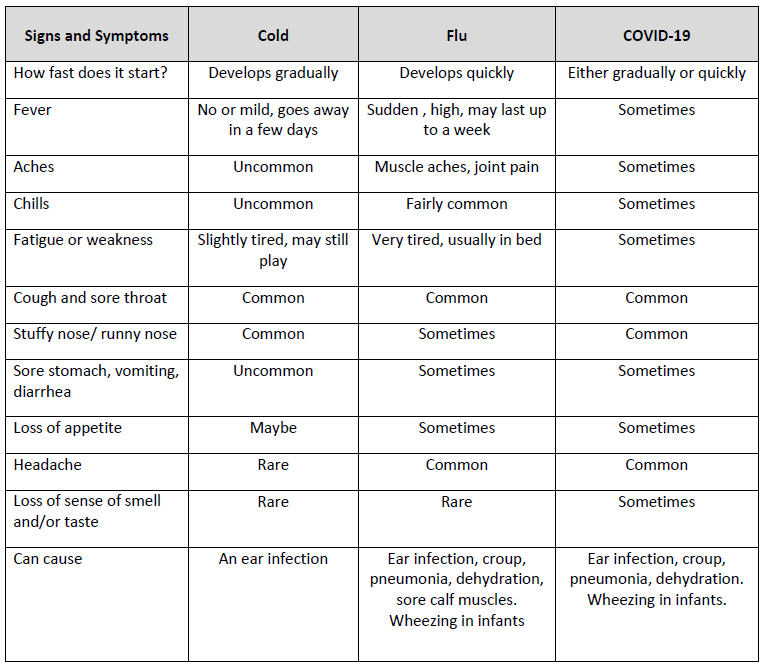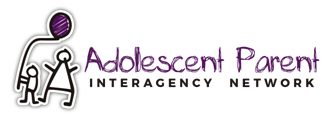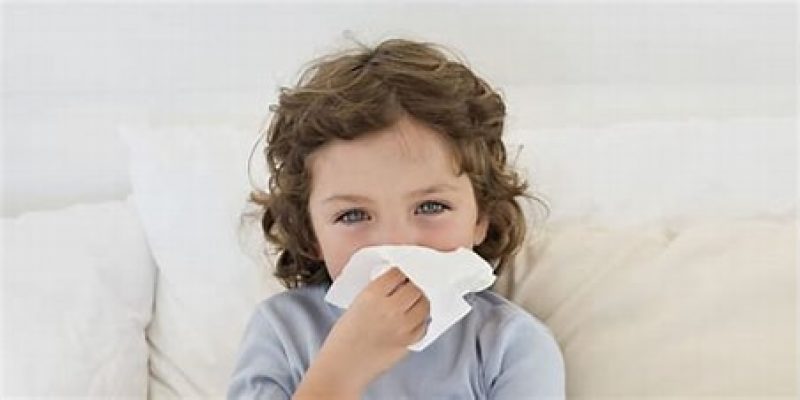Blog provided by Population and Public Health Winnipeg Regional Health Authority, creator of the Healthy Parenting Winnipeg Website which provides evidence-based information for expectant and new parents.
What is a cold?
A cold is a common illness that affects the nose, throat and sinuses. There are many different cold viruses, so your child may have eight to 10 colds in a year.
What is the flu (Influenza)?
The flu is a respiratory infection caused by the influenza virus. It also can affect the nose and throat. It is most common between October and April.
What is COVID-19?
COVID-19 is caused by a coronavirus. It can be so mild that you don’t feel any symptoms. Covid-19 can also cause symptoms that are similar to a cold or the flu.
How is a cold, the flu or COVID-19 spread?
Colds, flus and COVID-19 are all caused by viruses (germs). They are spread from one person to another when the germ gets into the mouth, nose or eyes. This can happen when:
- Coughing, sneezing, kissing, holding hands
- Touching used tissues, toys and other surfaces
Common signs and symptoms of colds, flu and COVID-19
A word about COVID-19: It is very difficult to tell if you have COVID by looking at symptoms. Some people who test positive for COVID-19 have no symptoms at all or very mild symptoms, especially if they have been vaccinated. Some people can get very ill with high fever and breathing problems.

What should I do if I think my child has a cold, the flu or COVID-19?
- A cold, the flu and COVID-19 are all caused by viruses. They will last a few days to a few weeks and go away on their own. Antibiotics will not help.
- If your child is sick, you should keep them comfortable and care for them at home.
- Children with chronic diseases, cancer, and those taking medications that suppress the immune system should contact their doctor if they have symptoms of influenza or COVID-19.
- For advice about when your child should see a doctor click here.
Tips for comforting your sick child:
- Make sure your child gets plenty of rest and fluids.
- Gargling with warm salt water can help soothe a sore throat.
- If your child has a fever, dress your child in light clothing and remove any extra blankets. For managing fever see our page on kid’s fever what to know, when to get help.
- For information about fever medicine, cough and cold medicines and medicated nose sprays click here.
- Colds, influenza and COVID-19 cannot be treated with antibiotics. Antibiotics should only be used when children develop bacterial infections, such as an ear infection or pneumonia.
- Use saline (salt water) drops to help clear a stuffy nose. If your infant is having trouble feeding because of a stuffed nose, you can use nose suction products: such as a nasal aspirator or bulb suction. Use saline nose drops or saline nose spray if the mucus is very thick. The spray goes well into the nasal passages and may be easier to use and may work better than the drops.
Used with permission from the Hospital for Sick Children
Note: Other videos may be recommended by the host channel (e.g. YouTube, Vimeo). These suggestions may be based on your personal search history and other factors. The WRHA does not control these suggestions and is not responsible for and may not endorse the content.
How is a cold, the flu or COVID-19 diagnosed?
- To diagnose a cold, your health care provider will examine your child and ask about their signs and symptoms. They may do a throat swab to rule out strep throat (a bacterial throat infection).
- To diagnose the flu, your health care provider will examine your child and ask about their signs and symptoms. They may also do a nose and throat swab to test for the influenza virus if your child has a serious medical condition such as cancer, or is being admitted to the hospital.
- You can test yourself and your child for COVID-19 using a Rapid Antigen Test.
How to prevent the spread of a cold or the flu
- Cold and flu symptoms could also be COVID-19. Follow public health guidelines to prevent your child from getting or spreading these viruses.
- Have your child vaccinated for all recommended illnesses including the seasonal influenza vaccine (“the flu shot”) and thee COVID-19 vaccine. The flu vaccine is safe for any child over 6 months of age and it is suggested your child gets it every year.
- It is also important for parents, family members and caregivers of your child to get vaccinated for the flu so that they do not spread the flu.
- To learn more see: Seasonal Flu, Government of Manitoba.
- Check for availability and recommendations for the COVID-19 vaccine (see Protect Manitoba)
- Wash your and your child’s hands with soap and water after coughing, sneezing or wiping a nose. To learn more see Hand Hygiene, Government of Manitoba.
- Sing your child’s favourite song with him while washing hands to make sure he is washing long enough.
- Cough and sneeze into the inside of your elbow or into a tissue instead of your hands. Teach your child to do this too! To learn more see: Cover your Cough and Sneeze, Healthy Child Manitoba.
- Keep your child home from daycare or school when they are sick to prevent spreading germs to other people.
- Teach your child to not share items that may be dirty with germs such as cups and eating utensils.
For more information:
- If you have further questions or concerns talk to your health care provider or call Health Links-Info Santé (Winnipeg 204-788-8200, toll-free 1-888-315-9257)
- Flu – Government of Manitoba
- Influenza in Children – Caring for Kids
- Influenza: Do Bugs Need Drugs – Alberta Health Services and British Columbia Centre for Disease
- Caring for a Child with the Flu Factsheet – Government of Manitoba
- Fighting the Flu Poster – Government of Manitoba
- Could it be the Flu? – Government of Manitoba
- Colds in Children – Caring for Kids
- Cold/Runny Nose: Do Bugs Need Drugs – Alberta Health Services and British Columbia Centre for Disease
- https://sharedhealthmb.ca/files/covid-19-child-health-info.pdf
- COVID-19 – Government of Manitoba
- COVID-19 Information and Testing in Children, Shared Health
- COVID-19 and your child – Canadian Paediatric Society

